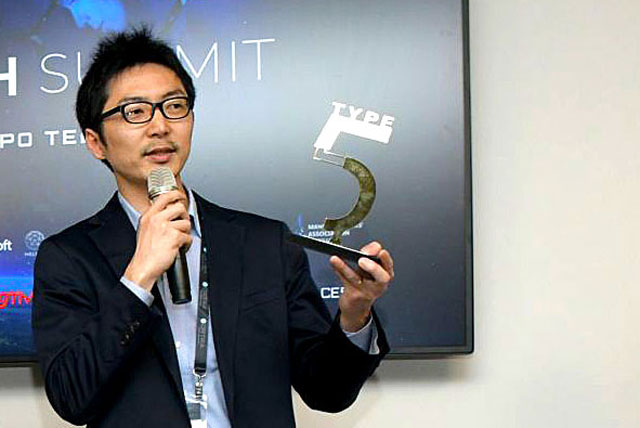JETRO Global Connection -Accelerate Innovation with Japan-
Interview
The Japanese startup building technology that could revolutionize microscopy
(Japan)
Nov 15, 2023

IDDK![]() is a Japanese startup, founded in 2017 by Soichiro Ueno, formerly with TOSHIBA, who’ve developed a unique microscopic observation technology. They’ve received funding from JAXA in addition to equity investments from TOSHIBA, DNP, and Misuzu Industries, and were the winners of the pitch competition at the Space Tech Summit 2023 in Israel. They’re already building global partnerships for their MID (Micro Imaging Device), which does not use a standard optical lens found in conventional microscopes, but instead uses a single-chip, semiconductor processing visual technology.
is a Japanese startup, founded in 2017 by Soichiro Ueno, formerly with TOSHIBA, who’ve developed a unique microscopic observation technology. They’ve received funding from JAXA in addition to equity investments from TOSHIBA, DNP, and Misuzu Industries, and were the winners of the pitch competition at the Space Tech Summit 2023 in Israel. They’re already building global partnerships for their MID (Micro Imaging Device), which does not use a standard optical lens found in conventional microscopes, but instead uses a single-chip, semiconductor processing visual technology.
In fact, the company is developing automated bio-laboratories in outer space working to design space experiment missions, and hope to play a role in the next generation of cutting edge scientific discoveries.
We spoke to IDDK’s Co-CEO and CFO, Kohei Yoshioka, about their startup journey, and their ambitious plans to scale and send their technology to outer space.

Some of IDDK's Staff, including CEO Soichiro Ueno, CFO Kohei Yoshioka, Chief Scientific Officer Wataru Ikeda, Chief Strategic Officer Mitsuaki Shiota, Lead engineer Yusuke Takeuchi (Photos provided by IDDK)
Can you introduce yourself, IDDK, and what the company has accomplished since you joined?
My background is finance, and I decided to join IDDK because of the passion I felt when I spoke to the founder, Mr. Ueno.
MID is a technology invented by our founder. It is a one chip microscopic observation technology. So if you use MID, you don't need a lens and camera to digitally get microscopic data.
IDDK is a totally different environment compared to the large enterprise where I worked for past several years. We have only eight employees and our office is only in Tokyo. When I started working in IDDK, I had to start from creating rules of the company. But it was interesting, I think I am more comfortable working in startups rather than large organizations.
How can IDDK assist in the next “generation of discoveries” – can you give some examples of what kinds of discoveries can be possible with your technology?
We aim to deliver our technology, MID, to places where conventional microscopes were historically inaccessible due to physical, technical or economical restrictions. We believe MID is a technology that can create a better future for humanity through increased accuracy and accessibility in diagnosis, observation, and discoveries.
The challenging conditions of outer space makes bringing big and heavy traditional microscopes difficult. Our MID offers a solution, enabling researchers to conduct detailed experiments on several platforms, including the International Space Station, but also beyond the satellites. The type of research that can benefit from our technology is drug development, vaccine production, tissue engineering, cancer research and protein research, things like that.
Space is one area we are focusing on now, but we are sure that our technology can be applied in terrestrial settings as well, such as medical or sanitation and primary industries such as agriculture or fishing.
But, most people don't know that space experiments can benefit the people right on Earth. For example, when you do protein crystallization in a microgravity environment, it can create large and perfect crystals because there is no gravity. Crystallized protein will help scientists to discover and research new drugs for diseases like muscular dystrophy.

IDDK at Starburst Aerospace's Accelerator Program Demo Day (Photos provided by IDDK)
What are some of your milestones or main accomplishments as a startup?
Graduating from the accelerator program of Starburst Aerospace![]() is one of our milestones. Last May we also won a pitch contest in a space tech summit held in Israel.
is one of our milestones. Last May we also won a pitch contest in a space tech summit held in Israel.
Also, we executed MoU with the Mohammed bin Rashid Space Centre![]() in Dubai, to offer space bio-experiment service using IDDK technology to United Arab Emirates researchers and scientists, and also to spread this service to other countries in the Middle East. This MoU was exchanged in front of the Japanese Prime Minister and UAE President at the UAE and Japan Business Forum.
in Dubai, to offer space bio-experiment service using IDDK technology to United Arab Emirates researchers and scientists, and also to spread this service to other countries in the Middle East. This MoU was exchanged in front of the Japanese Prime Minister and UAE President at the UAE and Japan Business Forum.
Our service will be demonstrated next year and our service will begin in 2025.

Picture of the MOU signed with MBRSC in Dubai, with Japanese Prime Minister Fumio Kishida (Photo form Prime Minister’s Office of Japan HP) *1
What are some of the challenges IDDK has faced as a startup?
There are a lot of challenges we've faced since I joined, starting from making business models, business brands and building a worldwide supply chain to deliver our service to end users. There’s also marketing, not only to develop customers, but also to educate customers. When you do business in the space field, access to the global ecosystem is required to find business partners to optimize our supply chain.
We haven’t overcome all the issues, but we are trying to address those challenges with the support of accelerators, including one sponsored two years ago by JETRO.

Pitch contest award at SPACE TECH SUMMIT (Photos provided by IDDK)
Can you tell us a bit about the support you have received from JETRO?
We joined several programs offered by JETRO and received much support. We went to some international conferences, financially and operationally supported by the JETRO team and also participated in the Techstars program, sponsored by JETRO. That support is really helpful for startups because we always have human resource limitations.
So I feel like the JETRO team are also IDDK members. We need to continue our effort year over year to build our presence, and this means we need continuous support from JETRO.
Where do you hope to see IDDK in five or ten years?
When we look at the market for experiments and manufacturing using microgravity environments, McKinsey issued a report saying it will be a $5 to $6 billion market in 2025.
Five years after the demonstration next year, IDDK is looking to democratize space bio-experiments, we will provide space experiment platforms to generate innovation to address social issues that cannot be resolved through ground-based research alone. We will provide a one stop shop for microgravity service to end users. This means that IDDK will help design the space mission together with end users, fabricate the experiment unit using our technology, then facilitate launching satellites for microgravity research.
We have a lot of things to tackle and step up to the next stage but I'm satisfied with the journey so far. We are looking for customers, investors, and talents who would like to join our journey to generate innovation to address social issues that cannot be resolved through ground-based research alone.
*1 Photo form Prime Minister’s Office of Japan HP![]()
- Profile of Mr. Kohei Yoshioka, Co-CEO and CFO
-
Mr. Yoshioka is mainly responsible for financial management as well as the business strategy and the development of space bio experiment business.
He also has been involved extensively in customer development and international marketing as well as establishing the company's internal management system.
- Report by:
- SASAGAWA Saki, Startup Support Division, JETRO

-
Overview of Japanese Startup Investment for US Venture Capitalists

May 2025
-
TBM, a Japanese Unicorn, is taking its environmentally conscious materials and solutions global

April 2025
-
Algal Bio’s Plan to Scale-up Microalgae Solutions for Food, Health, Climate, and more

March 2025
-
From Complexity to Clarity: How Veritus Helps Professors and Research Labs Innovate 5X Faster

February 2025
-
Biodata bank: Innovating Heat Risk Solutions for a Warming World

February 2025
-
Thermalytica’s Improved, Nano-scale Insulation Technology Could Change the World

January 2025
-
Techstars Tokyo Demo Day shows how Japan is Making Strides Towards Becoming a Global Startup Hub

December 2024
-
Redefining Health Through Better Movement with Shosabi

December 2024



